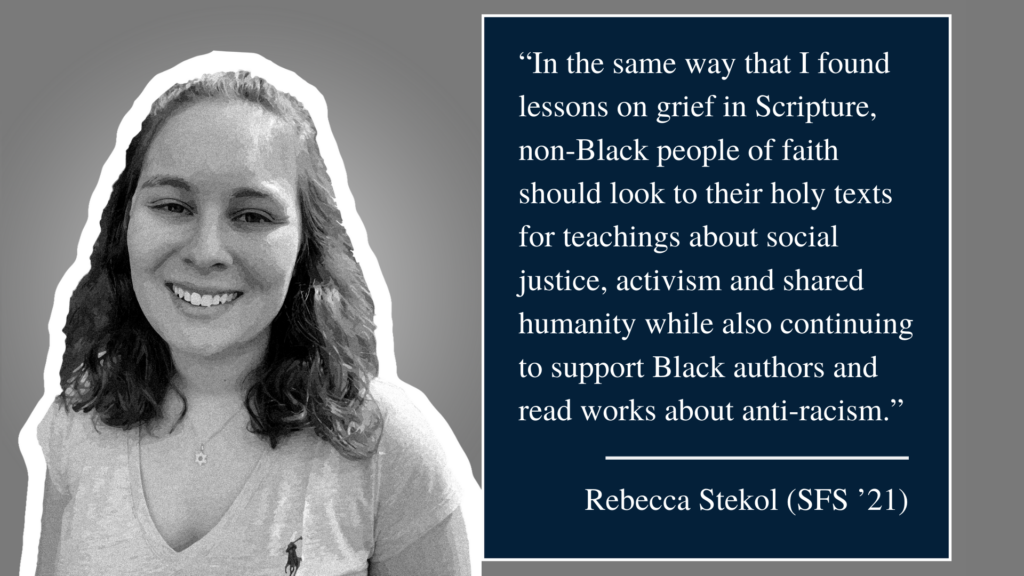As I scrolled through Twitter, filled with rage at recent events, I came across a tweet that quoted chapter 31 of the book of Jeremiah: “A cry is heard in Ramah — Wailing, bitter weeping — Rachel weeping for her children. She refuses to be comforted for her children, who are gone.” The post referred to a video in which Rev. William J. Barber II used the passage in a CNN interview about the reactions to George Floyd’s murder. He stated that the protests are an act of “public mourning where people are refusing to be comforted. And America better hear them.”
I sorely needed this reminder. I was carrying a deep feeling of anger that had been building. I was angry at how residents of my hometown in Long Island, N.Y. — one of the most racially segregated places in the United States because of a long and ugly history of housing discrimination — blocked Black Lives Matter protestors from marching. I was angry at the willful apathy with which people and institutions treat the intergenerational trauma of the Black community. I was angry at the fact that asking the United States to stop killing Black people is controversial. And I am still angry.
Barber’s application of the passage from Jeremiah, however, inspired a more powerful emotion: grief. With all the outrage in my head and on social media, I had not given myself the space to mourn the people whose names flashed on my screen. They had become a springboard for important conversations about broader systemic issues, but in that process, much of the world saw them as just symbols rather than people with hopes, families and futures. Even though I am educating myself on systemic racism and structural violence, my academic ramblings caused me to neglect the humanities of Breonna Taylor, Ahmaud Arbery, George Floyd and many others, thereby highlighting my flawed allyship.
In the same way that I found lessons on grief in Scripture, non-Black people of faith should look to their holy texts for teachings about social justice, activism and shared humanity while also continuing to support Black authors and read works about anti-racism.
In my Reform Jewish tradition, the Torah is a living and breathing text, filled with dynamic, flawed and even evil characters. Jewish thinkers and Rabbis throughout history have challenged every word, seeking to find deeper meanings and leaving behind thousands of pages of interpretations. Like the Biblical figure Job, we are asked to grapple with G-d and the injustices in His world.
Judith Plaskow, a Jewish feminist theologian, writes in “Beyond Sarah and Hagar: Jewish and Muslim Reflections on Feminist Theology” that the Torah contains within it the world in all its complexity, and, more specifically, it holds up a mirror to destructive dynamics in our own contemporary society. A prime example of this idea is the story of Sarah and Hagar in Genesis. Hagar was a slave woman, owned by Sarah and given to Abraham as a vessel for his child. Sarah mistreated Hagar throughout her pregnancy and birth, eventually expelling her and her son, Ishmael, to the desert. G-d, hearing Ishmael’s cries, revealed a well to Hagar and promised to make a “great nation” out of Ishmael.
This story sheds light on various structural injustices — unequal power dynamics, oppression, male domination, the ownership of people as property. The modern-day crises that stem from systemic white supremacy and anti-Black racism — police brutality, the school-to-prison pipeline and redlining to name a few — contain core similarities with the injustices found in the story of Hagar and Sarah. Sarah and Abraham alienated Hagar because of the social status that she was born into. She was expendable, abused by those in power and cast away when she was no longer needed. Because of her identity, Hagar’s life didn’t matter to Sarah and Abraham.
However, Biblical scholars today are amplifying Hagar’s story and her importance in the holy texts. Most notably, feminist scholars have sought to reclaim Hagar as a matriarch and a survivor, rather than a victim. In particular, Black womanists like Delores Williams use Hagar as a conduit to discuss the plight of Black women and to enrich the study of oppression in theology.
I have struggled with religion, discouraged by how people throughout history have abused holy texts. But I know these texts teach us to fight for a more just future.
Before continuing that fight, however, I needed to take the time to mourn Breonna Taylor, Ahmaud Arbery, George Floyd and countless more Black people killed by white supremacy as souls and as humans. Rather than aimlessly scrolling through Twitter and letting my rage build, I needed to step back and listen to people like Barber and read authors and thinkers like Williams. Please do the same, even after these conversations stop trending. Read, educate, sign petitions, donate and amplify Black voices. Never stop grappling with injustice. Black Lives Matter.
Rebecca Stekol is a senior in the School of Foreign Service. Faith in Action appears online every other Tuesday.









